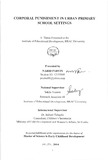| dc.description.abstract | Corporal punishment is a common phenomenon in Bangladeshi schools. On 13 January, 2011
The High Court division of The Supreme Court issued a ruling on prohibiting of corporal
punishment. Subsequently, The Ministry of Education published a circular stating that
corporal punishment is prohibited in schools. Despite the prohibiting, newspaper and some
research revealed that the practice of corporal punishment is still remaining in schools. A
study report of BLAST showed 77.1% students were inflicted corporal punishment in their
schools (Global Initiative to End All Corporal Punishment of Children, 2012).
The aim of this study was to explore teachers', parents' and children's perception towards
corporal punishment in urban settings. An In-depth Interview-based, qualitative approach was
carried out to collect data for the study. In this study, four children (2 girls and2 boys) aged
6-8 years studying in grades one and two were selected from two Government and a non-
Government primary schools. The other participants were the parents of these children and
their teachers. All participants were selected through the convenient sampling technique.
Twelve IDIs were conducted with twelve participants (4 teachers, 4 parents and 4 children).
Data were analyzed according to the content analysis approach'
The findings revealed that there were mixed perceptions come out from the participants
towards corporal punishment in schools. More than half of the participants (parents and
teachers) perceived that corporal punishment is necessary to maintain discipline in the
classroom, because it is the easiest way to manage overcrowded classrooms as well as it is
useful for better academic achievements. But they suggested using it more lightly. The rest of
participants believed that corporal punishment would not be needed to maintain discipline.
The perception of children was that corporal punishment is not a good method, because
punishment is shameful and painful for everyone. Most of the children feel embarrassed
when they are punished. Study results indicated that when teachers fail to control class, they use corporal punishment
as well as when children talk with each other in the classroom, make noises, do not bring
their homework, disobey the teacher, violate teacher's orders, tell lies, repeat mistakes then
children are subjected to corporal punishment. Study also revealed some other factors like
large class, poor salary, low level ofjob satisfaction, heavy workload including other
administrative work and traditional thinking of corporal punishment that indirectly stimulate
teachers for applying corporal punishment.
The findings of the study showed that almost all of the participants were aware of the
negative effects of corporal punishment, but most of them perceived that corporal punishment
is one of the most effective disciplining measures in schools that work immediately. For
using of corporal punishment, children might show disrespect to teachers, lose their selfconfidence
and lose their interest that could be lead to poor learning as well as absenteeism
and dropout rate might be increased.
The result also identified some possible alternative options to maintain discipline such as
small class sizes, co-teacher for large classes, talk to children, counseling, listen to them and
value them as well as teach them in interesting ways in a child friendly learning environment.
In conclusion, corporal punished should be stopped and teachers should be trained on
creating supportive environment for learners and classroom management without using
corporal punishment.
The study made some recommendations that the government to make explicit the rule of
prohibiting corporal punishment in legislation as well as to provide teachers training on
classroom management and alternative strategies to control discipline problems in school.
The study suggested for further studies to identify the current practice of corporal punishment
after banning in both urban and rural context. The other research would be required on how
teachers can use alternative methods other than corporal punishment. Awareness raising is
essential since corporal punishment is a violation of the rights of children. | en_US |

